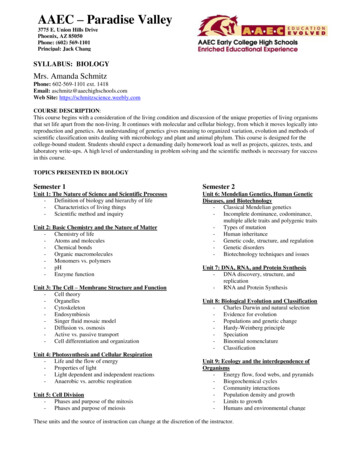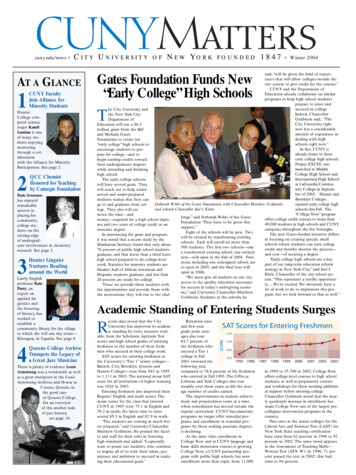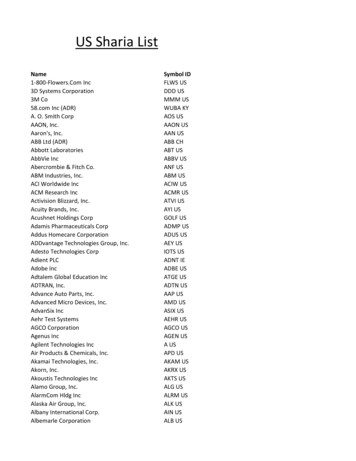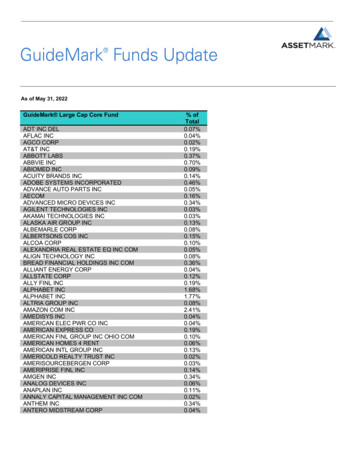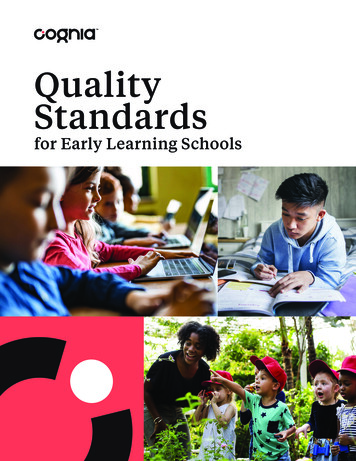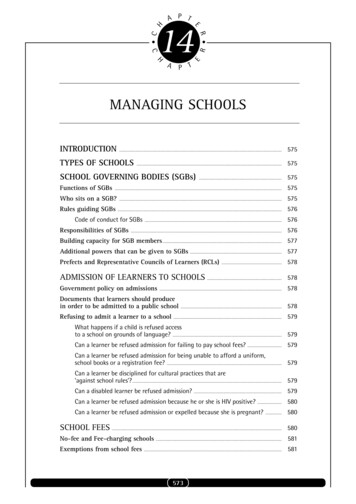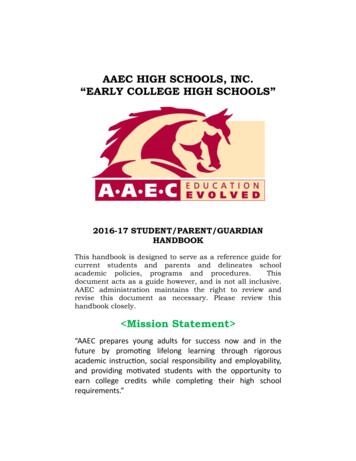
Transcription
AAEC HIGH SCHOOLS, INC.“EARLY COLLEGE HIGH SCHOOLS”2016-17 STUDENT/PARENT/GUARDIANHANDBOOKThis handbook is designed to serve as a reference guide forcurrent students and parents and delineates schoolacademic policies, programs and procedures.Thisdocument acts as a guide however, and is not all inclusive.AAEC administration maintains the right to review andrevise this document as necessary. Please review thishandbook closely. Mission Statement “AAEC prepares young adults for success now and in thefuture by promoting lifelong learning through rigorousacademic instruction, social responsibility and employability,and providing motivated students with the opportunity toearn college credits while completing their high schoolrequirements.”
District Office and Campus addressesDISTRICT ADMIN OFFICES3636 North Central AvenueSuite 1050Phoenix, Arizona 85012602-297-8500602-290-8540 FaxSOUTH MOUNTAIN AAEC2002 East Baseline RoadPhoenix, Arizona 85042602-323-9890602-323-9869 FaxPRINCIPAL-Linda LaFontainASSISTANT PRINCIPAL-Brian SnoddyPARADISE VALLEY AAEC3775 East Union Hills DrivePhoenix, Arizona 85050602-569-1101602-569-6372 FaxPRINCIPAL- Martha Braly, Ed.DASSISTANT PRINCIPAL-Angie MadsenASSISTANT PRINCIPAL-Liz GonzalezRED MOUNTAIN AAEC2165 North Power RoadMesa, Arizona 85215480-854-1504480-854-3564 FaxPRINCIPAL– Ray GlessASSISTANT PRINCIPAL-Lori SchneiderESTRELLA MOUNTAIN AAECPRESCOTT VALLEY AAEC3400 North Dysart Road7500 East Civic CircleAvondale, Arizona 85392Prescott Valley, Arizona 86314623-535-0754928-775-3200623-535-1210 Fax928-775-3201 FaxPRINCIPAL-Dale NicolPRINCIPAL-Patrick WellertASSISTANT PRINCIPAL-Jeremy HendrixASSISTANT PRINCIPAL-Liz GonzalezDistrict AdministrationMrs. Linda Proctor-DowningExecutive Director/FounderSuzanne DrakesAssistant Executive DirectorLinda RosnessAssistant SuperintendentAdministrative ServicesOtilia CuevasDirector of Human ResourcesDan BiglerCPA/AccountantDonella JuradoFinance ManagerDennis GrayDirector of Curriculum & TestingJames WilliamsDirector of Student ServicesGoverning Board 2016-17Michael Larabee, PresidentKen Roberts PHD, Member-SecretaryPam Burns, Member-TreasurerLinda McCormick, MemberLinda Proctor-Downing, Member-Executive Director2
Educational PhilosophyThe AAEC Professional Learning Community strives for excellence by providing rigorousand relevant academic curriculum, unique cultural experiences and exposure tocommunity involvement.The values that AAEC stresses to its students include: being a responsible citizen, able torespect others socially and intellectually, always accountable for their actions as to howthey represent themselves, their families and AAEC. As such, they become trustedindividuals that show compassion towards all human beings by participating in strongcommunity service projects and exhibiting hard work and honesty.School of ChoiceAAEC is a school of choice. Therefore, it is our expectation that students will choose toexcel in all areas of their education. AAEC students flourish as they learn to become goodself-managers, work towards personal and academic goals, and display an awareness ofthe work ethic, academic accomplishment, and personal responsibility that prevail in anEarly College High School.Graduation RequirementsThe AAEC academic program allows qualified students the opportunity to earn concurrenthigh school and college credits. Graduates who have excelled may earn sufficient creditsto earn an associate’s degree or complete their AGEC (Arizona General EducationCurriculum). However, most students will need to pay for some college classes in order toget an Associate Degree. Graduation Requirements: (1 credit 1 year of study) COURSESCREDITSSEMESTER CLASSESEnglish48Math48Science36Global Studies12World History12US History12Economics.51US Government.51Fine Arts/CTE12World Language22 college or 4 high schoolCPD150/STU150.51Electives3.57TOTAL2242 (44)Each student must complete 15 hours of community service for each semester theyattend AAEC.All students will take state recommended tests.The Arizona Department of Education requires all students to complete anEducational and Career Action Plan (ECAP).All students must take and pass the Civics test in order to graduate.3
Academic InformationAcademic PoliciesDistrict Grading Scale:90 - 100% A80 - 89% B70 - 79% C69% - FAt least a “C” is required to pass a class and receive credit. This applies to all classestaken at the high school and college.College credits are transferred to high school credits using the following itcreditscreditscreditscredits .17 high school credits .34 high school credits .50 high school credits .68 high school credits .84 high school creditsIncomplete grades for any course must be completed within a defined amount of time orthey will become an “F” by default.If a course is retaken, the new grade is calculated into the grade point average (GPA).Summer school is available to make up “F’s” or Incompletes. Each campus establisheseligibility for summer school and the number of semester classes that can be taken.Academic probation is a condition of heightened accountability and greater support.Based on their performance, students may be placed on academic probation at any time.Parents will be informed; a mentor may be appointed and conditions to remain in schoolwill be established. A student making no effort to improve after being placed on AcademicProbation may be supported in finding a more appropriate school environment. Gradepoint average (GPA) is determined by two methods. Unweighted GPA is calculated bygiving all classes taken the same weight. A weighted GPA gives an additional grade pointto each college class successfully completed.The School YearThe calendar for the current school year may be referenced at the AAEC website:www.aaechighschools.comChange of high school scheduleChanges in students’ schedules are allowed only under specific circumstances delineatedon the schedule form. If there is a schedule conflict the student will fill out a schedulechange request form and submit it for administrative approval.Student use and care of textbooks and related materialsIn compliance with Arizona Revised Statutes, the AAEC District may provide free highschool textbooks for all students (college textbooks and materials are purchased by theindividual student/family.) Additionally, ARS 15-727 and 15-729 require students to beresponsible for the care of textbooks and related materials. Accordingly, students will be4
charged for damaged books and materials. Students who fail to return textbooks andmaterials will be charged the full purchase price to replace lost or missing books.HomeworkHomework is necessary to reinforce information and skills learned daily. Students canexpect assignments on a regular basis. Parent support is expected.Assessments/ExamsFinal exams are scheduled in all classes at the end of each semester. All students musttake a final exam. Taking exams early must be approved by the campus administrator,not individual teachers.All students must take all assessments required by each department. If a student missesan assessment, he/she is required to make it up, following the absence policy. Allstudents are required to take a final assessment. The date of this assessment isannounced in advance.ParentVue and StudentVueIt is the responsibility of students and parents/guardians to check the student’s gradesfrequently online through ParentVue and StudentVue. See the Executive Assistant in thefront office for the website and access code.Progress reportsProgress Reports are issued and posted on Parent Vue and Student Vue throughout thesemester. These reports indicate how a student is doing in each course. Teachers,parents or guardians, and students are encouraged to communicate about progressreports via email or by scheduling a parent/teacher conference.Report cardsOfficial report cards will be issued and posted two times per year. Only the first andsecond semester grades are entered onto the student’s official transcript. Parents/guardians and students can expect to receive report cards within two weeks of the end ofeach semester.Honor rollAt the end of each semester, Honor Roll lists will be posted. The following criteria will beused to govern eligibility: All courses taken for credit are utilized in the computation. Anystudent receiving a failing grade in any subject will be ineligible for consideration.Weighted GPA’s are utilized for computation. Honor Roll minimum of a 3.0 GPA;Principal’s List minimum of a 3.5 GPA.Class rankStudents will be ranked on the basis of their grade point average which will include allcourses the student has taken. Computations for ranking purposes will be carried out tothree (3) decimal places. Both weighted and unweighted GPA’s are included on thestudent’s transcript; however, class rank is based on the weighted GPA.5
Parent meetingsAt the request of either the parent or guardian or teachers, a meeting will be scheduled toreview: student progress, adjustment to school, work habits, homework, or patterns. Ameeting may also be called to create a plan for improvement.Student recordsSchool records may only be shared with or given to a custodial parent or guardian. In allother situations, the parent/guardian will be advised of anyone trying to access theserecords.The Family Educational Rights and Privacy Act (FERPA)The Family Educational Rights and Privacy Act (FERPA) (U.S.C.§1232g; 34 CFR Part 99)is a federal law that protects the privacy of student education records. This law applies toall schools that receive funds under an applicable program of the U.S. Department ofEducation.FERPA gives parents certain rights with respect to their children’s educational records.These rights transfer to the student when he or she reaches the age of 18 or attends aschool beyond the high school level. Students to whom the rights have transferred are“eligible students.”Parents or eligible students have the right to inspect and review the student’s educationalrecords maintained by the school. Schools are not required to provide copies of recordsunless, for reasons such as great distance, it is impossible for parents or eligible studentsto review the records. Schools may charge a fee for copies. Parents or eligible studentshave the right to request that a school correct records which they believe to be inaccurateor misleading. If the school decides not to amend the record, the parent or eligiblestudent then has the right to a formal hearing. After the hearing, if the school stilldecides not to amend the record, the parent or eligible student has the right to place astatement with the record setting forth his or her view about the contested information.Generally schools must have written permission from the parent or eligible student inorder to release any information from a student’s record. However, FERPA allows schoolsto disclose these records, without consent, to the following parties or under the followingconditions (34 CFR § 99.31): School officials with legitimate educational interests; otherschools to which a student is transferring; specified officials for audit or evaluationpurposes.Withdrawal from schoolStudents who withdraw from school are required to obtain an official withdrawal formfrom the office. This form must be initiated by the parent/guardian. When the studenthas been cleared by each teacher and has turned in all books and materials, an officialwithdrawal form will be issued.Academic integrityPlagiarism and cheating, whether deliberate or otherwise, will not be tolerated.Plagiarism is the use of another person’s work, regardless of quantity (e.g. one sentence,paragraph, entire text, or product) whether done deliberately or not. In using quotationsor citations from the work of other individuals, students will be required to follow theteacher’s instructions for citing citations properly.In the absence of teacher’sinstructions, students will use MLA format.6
In addition, all work must be the student’s own. Cheating of any kind will not betolerated. Cheating is defined as copying or plagiarizing another person’s paper,homework, daily work, quiz, or test. It includes having unsanctioned notes/text messagesduring a quiz or test, looking at another student’s paper during a quiz or test, speakingout loud during a quiz or test in a way that would assist another student or themselves,or giving work to someone else. Any student caught cheating or helping another studentcheat will receive a zero on the assignment and his or her parents will be notified. If ateacher determines that plagiarism or cheating has occurred, academic sanctions anddisciplinary consequences will be administered.National Honor SocietyThe National Honor Society is a nationwide organization of which AAEC National HonorSociety is a charter member. The purpose of NHS is to create enthusiasm for scholarship,stimulate a desire to render service, promote leadership and develop character in thestudents of our high school. NHS membership is an honor afforded to outstandingsophomores, juniors and seniors. To be considered for membership, students mustmaintain a minimum 3.5 cumulative GPA. Students must also meet rigorous criteria forleadership, character and service.College-ready student/qualified studentAny student, who maintains a “C” or better in all classes, including college classes, isconsidered a college-ready student. A student who falls below this standard at the end ofthe semester may be limited in taking college classes the following semester. If a studentwithdraws from or drops a college class, with or without approval, he/she is notconsidered a qualified student, will be placed on academic probation and will not beregistered in college classes for the following semester. If any class has not been passedwith a “C” or better, the student is automatically placed on academic probation and willnot be registered in college classes for the following semester. In addition, students willonly be able to take college courses as long as they maintain grades of a “C” or better andmaintain school attendance requirements for all AAEC and college classes.AAEC students and the community collegeStudent conduct at the college reflects on AAEC and its students. Therefore, all AAECrules and policies apply to students while at the college. Students must take the collegeplacement test (ACCUPLACER) in order to take college classes. Courses taken willnormally be those that contribute to completing an Associate’s Degree or the AGEC(Arizona General Education Curriculum) and are at the transferable level (100’s or above.)Only college credits earned with a “C” or above will transfer to AAEC as highschool credit and be considered as successful completion of the course. AAEC paystuition for qualified Arizona residents' college classes. Classes not successfullycompleted are retaken at the student’s expense. Dropping a class or being issued a“W”, or “I” is not considered successful completion of a college course. Modificationto the college plan will be made if a student’s academic performance or personalaccountability comes into question. The school uses the input students receive from theircollege advisors for academic planning (college pathway.) The community college requiresthat students enrolled in college courses have the necessary course textbooks. Collegetextbooks and any special college course fees are the responsibility of the student/family. All students, regardless of their college class enrollment, will maintain full-timestatus (4 hours per day) for the days when high school is in session but college is not insession. Students may not enroll in college courses without approval by an AAECadministrator. Approval will not be given for Flex Express, GIL, certain hybrid classes oronline classes. Students enrolling in summer classes at the college do so at their ownexpense. Students who change college classes they are enrolled in, without the approval ofan AAEC administrator, are responsible for payment of the class/classes.7
Attendance policy – 90% attendance requirementIn order to receive credit for the semester, 90% attendance is required in each assignedclass.Classes missed due to school approved activities (i.e. field trips, studentgovernment, etc.) are excluded. Administrators are authorized to excuse additionalabsences for extended illness, injury or extenuating circumstances upon satisfactoryverification. In such cases, students are expected to make up missed work in a timelymanner. Please allow 24 hours for missed work to be compiled for any student who hasmissed three or more days of school. This allows time for faculty to prepare the necessarymaterials.State truancy lawSchool attendance is not only a good habit, but state law requires it. Arizona state law(ARS 15-802.A & ARS 15-803.E) requires that every person who has custody of a childbetween the ages of six and sixteen, ensures that child’s attendance at school unless theyare unable to attend due to illness or another legitimate reason. If a parent fails tocomply with law, they may be found guilty of a Class 3 misdemeanor.AbsencesRegular, uninterrupted attendance by students is fundamental to student success.Consequently, AAEC will make diligent efforts to support parents/guardians and studentsin the improvement of attendance.When a student is absent, the parent/guardian is expected to call the AdministrationOffice before 10:00 AM to inform the school of the absence. If the parent is unable to call,a note from a parent/guardian may be provided on the day the student returns to school.The note should include the student’s name, date of absence (s), the parent/guardian’sname and phone number. Absences not excused within 24 hours will remain unexcused.However, both excused and unexcused absences count against the 90% attendancerequirement.Religious absences are excused; doctor and dentist appointments will be excused with anote from the doctor’s office. The student is solely responsible for obtaining any missedwork due to the absence(s); it is not the responsibility of the teacher.Days allotted for homework recovery are as follows:For all excused absences, students have one day for each day missed to submit makeupwork.If a student misses school on Monday, homework is due Wednesday.If a student misses Monday and Tuesday, homework is due Friday.If a student misses Friday, homework is due the following Tuesday.Students informed of homework/assignments/tests/projects etc. prior to an absence willbe held accountable for their work according to the teacher’s expectations/syllabus. Thisincludes work due on the day of the absence.Teachers retain the discretion to assign alternative work for makeup or missedassignments, tests, projects, papers and quizzes as a result of any valid excused absence.Tardy policyA student shall be considered tardy if he/she is not inside the classroom when the classis scheduled to begin. Students arriving on campus after the class begins must report tothe office for a late pass. A late arrival to school may be excused if a parent or guardiancalls in, provides a note or accompanies the student to the office. These excusedtardiness will be limited to three per semester. All others will be considered unexcusedand students will be subject to disciplinary procedures.8
Students who are late to class throughout the remainder of the day will follow theirindividual teacher’s policy and procedure as outlined in their teacher’s syllabus.Excessive tardiness may require a parent or guardian/student/teacher/administratorconference and potential loss of college privileges.Arizona’s Workplace Employability Skills (WES) was defined by Arizona employers for thedeveloping 21st century workplace. The standards reflect the thinking and experience ofthe broadest possible section of Arizona business and industry so that the content isresponsive to the needs of any employer. Listed under professionalism is the expectationthat employees arrive at work on time. We believe it is our responsibility to instill thisworkplace skill in our students.Leaving school earlyParents or guardians must call the office to authorize an early departure for any reason.This must be completed before their student departs campus, and it is the student’sresponsibility to verify that permission has been received before leaving the campus.If a student becomes ill after arriving at school, he/she must report to the office. At thattime, the student’s parents/guardian will be contacted and a determination will be madeas to whether the student needs to be sent home. Any student not receiving permissionto leave/or who does not check out through the office will have a truancy (cut, unexcusedabsence) assigned.Makeup workStudents are responsible to make up all work missed when absent from school. It is thestudent’s responsibility to ensure that all work is obtained from their teacher uponreturning from any type of absence. The student has an amount of time equivalent to thenumber of days absent to submit the work. Students who are truant (ditching) will notreceive credit for a class.Chronic illnessARS 15-346 provides for adjunct accommodations for students with chronic healthproblems. This is defined in part as “ pupils who are unable to attend regular classesfor intermittent periods of one or more consecutive days because of illness, disease oraccident but who are not homebound.” A Chronic Health Illness Plan may be put intoplace when a medically certified, chronic illness impacts attendance. Students may beexempted from the 90% attendance requirement, as well as given modified assignmentsto replace what was covered during their absences.Student expectationsExpectations are high for student self-control and behavior. Students who choose to actout in ways that are inappropriate or are in any way disrespectful towards faculty, staffand peers will face consequences that may culminate in detention, suspension orexpulsion.All students are subject to the authority of all faculty and staff members during theregular school day and while attending any school function on or off campus. Theregular school day includes the time of travel to and from a student’s home. All studentsare expected to leave the campus when their day has concluded. Students are notallowed into classrooms or other school buildings for any reason without faculty or staffsupervision. Full-time enrollment requires that students actively be in a class for aminimum of 4 hours each day (including weeks when college classes are not in session.)Students must respect public and private property in the community. Defacing, litteringor trespassing is forbidden.9
Students are expected to be prompt to all classes. Report directly to class and obtainpermission from the teacher to leave class for any reason. Report directly and immediatelyto the office upon arriving late to school.Community serviceAll students are required to complete 15 hours of community service for each semesterthey attend AAEC. Community service must be through a non-profit organization, i.e.:library, church, hospital, food drive, etc. Student and club activities (unless specificallydesignated by the club/sponsor/ designee) do not count for community service hours.However, some hours such as approved/supervised student tutoring or peer mentoringmay apply. Students cannot miss regularly scheduled classes to complete communityservice. Timely and proper paperwork must be included with each submission.Guests/visitorsStudents not enrolled at AAEC are not permitted on campus. Individuals not employedby the school district must check in at the main office. Parents/guardians are alwayswelcome in the classroom with prior teacher and administrative approval. Parents arerequired to check in at the main office. It is usually best to call ahead for an appointmentas classes will not be interrupted for unscheduled meetings.Closed campusStudents are not permitted to leave school property during the school day withoutfollowing the proper procedures and signing out at the office.Food and drinksMeals and snacks are available for purchase during lunch. No food or drink is permittedin the classrooms. Food and beverages, during celebratory activities, may be permittedwith administrative approval.Drinking water is permitted inside the classroom providing it is in a container with a lid.In addition, due to possible health hazards, no high energy drinks, such as Red Bull,Rock Star, and Monster are allowed on campus. Chewing gum is not permitted inside oroutside any AAEC building or anywhere on campus premises.Electronic devicesStudents are expected to cooperate with all school personnel regarding the use of cellphones and other personal electronic devices.Devices used in the classroom without teacher authorization will be confiscated and takento the office. Parents may be required to pick up the device.Further discipline may be taken for repeat offendersBicycles/skateboardsBicycles/skateboards are to be locked and parked in the area provided within thecampus. They are not to be ridden on school grounds.Parking proceduresAll students who park a vehicle/motorcycle on AAEC grounds must have a valid Arizonadriver’s license. All vehicles/motorcycles must be registered in the main office. Studentdrivers must adhere to campus driving and parking rules. Students park at their own10
risk. Do not leave valuables in parked cars, as AAEC does not assume any responsibilityfor lost or stolen items. Student vehicles parked on school property are subject to searchby school officials if there is reasonable suspicion.Students must leave their vehicle and the parking lot immediately after parking. Sitting incars is prohibited during the school day, including lunch hours. There is absolutely noloitering in the parking lot during the school day. Students must drive their vehiclescarefully and with a concern for the well-being of others.Personal propertyPersonal or individual property brought on any AAEC facility is the responsibility of theindividual (staff, students, parents or guardians) bringing the item on site.AAEC is not responsible for lost, stolen or damaged personal items brought on an AAECfacility at any time.School/district transportationValley Metro bus cards are provided for students who live more than one mile from theschool. A parent permission slip must be on file in order to receive a bus card. In orderto receive a new bus card, the expired card must be returned. Students are required toattend school on a regular basis in order to receive a bus card. A fee will be charged forthe replacement of a lost or stolen bus card.Eligibility to participate in extra-curricular activitiesIn order to participate in extra-curricular activities, a student must be earning a passinggrade in each course in which they are enrolled and shall maintain satisfactory progresstowards graduation.Activities informationAll students who participate in field trips sponsored by AAEC do so with theunderstanding that any injuries or other medical problems that might occur must bereported to and will be addressed by the sponsor/advisor. Students who participate inextra-curricular activities must be covered by medical insurance. Medical coverage is theresponsibility of the family.FundraisingThe various clubs and activities on campus are permitted to hold fundraisers to fiscallysupport their activities. A written request for approval must be submitted to the StudentGovernment and an administrator. All monies earned must be recorded by campuspersonnel, and deposited to the District Office.School activities and dancesAll school policies will be in effect at all AAEC High School sponsored activities anddances. Student attire at school activities and dances must conform to the school dresscode. All students attending a school dance must conduct themselves appropriately.There is no loitering permitted on site during or after a dance. Students who do not vacatethe premises immediately after the dance will be restricted from attendance at futuredances. Students wishing to bring a guest must obtain a guest pass at least two weeksprior to the dance. Behavior that is inappropriate will result in the student being removedfrom the dance and no refund will be given. Further disciplinary action will be taken.11
AAEC disciplinary policyThe purpose of this student disciplinary policy is to help ensure a healthy, comfortableand educationally productive environment for students, employees and visitors.AAEC operates under a “no tolerance” policy for drugs, alcohol, weapons, tobacco, andviolence.Any behavior that disrupts the learning process and/or threatens the safety of AAECstudents, faculty, staff or visitors is subject to this discipline policy. Under the policy,there are three (3) main consequences for infractions:*Immediate suspension followed by a special disciplinary hearing or a boardhearing with arecommendation for expulsion.*Immediate suspension followed by a special disciplinary hearing or a boardhearing with a recommendation for a long-term suspension: 1 to 9 days of inschool or out-of-school suspension.*Detention or community service; if a student violates school policies on multipleoccasions, these multiple offenses may lead to progressive discipline and maypossibly result in expulsion.AAEC reserves the right to modify this discipline policy or the implementation of itsconsequences to account for special circumstances.Bullying/general harassmentBullying occurs when a student treats another abusively, or threatens another throughactions or statements that are reasonably interpreted as a serious expression of purposeto inflict harm. Bullying may include, but is not limited to:*Intentionally, repeatedly, or over time in any way inflicting or threatening toinflict physical or emotional injury or discomfort on another’s body, feelings
ESTRELLA MOUNTAIN AAEC PRESCOTT VALLEY AAEC 3400 North Dysart Road 7500 East Civic Circle Avondale, Arizona 85392 Prescott Valley, Arizona 86314 623-535-0754 928-775-3200 . In compliance with Arizona Revised Statutes, the AAEC District may provide free high school textbooks for all students (college textbooks and materials are purchased by the

